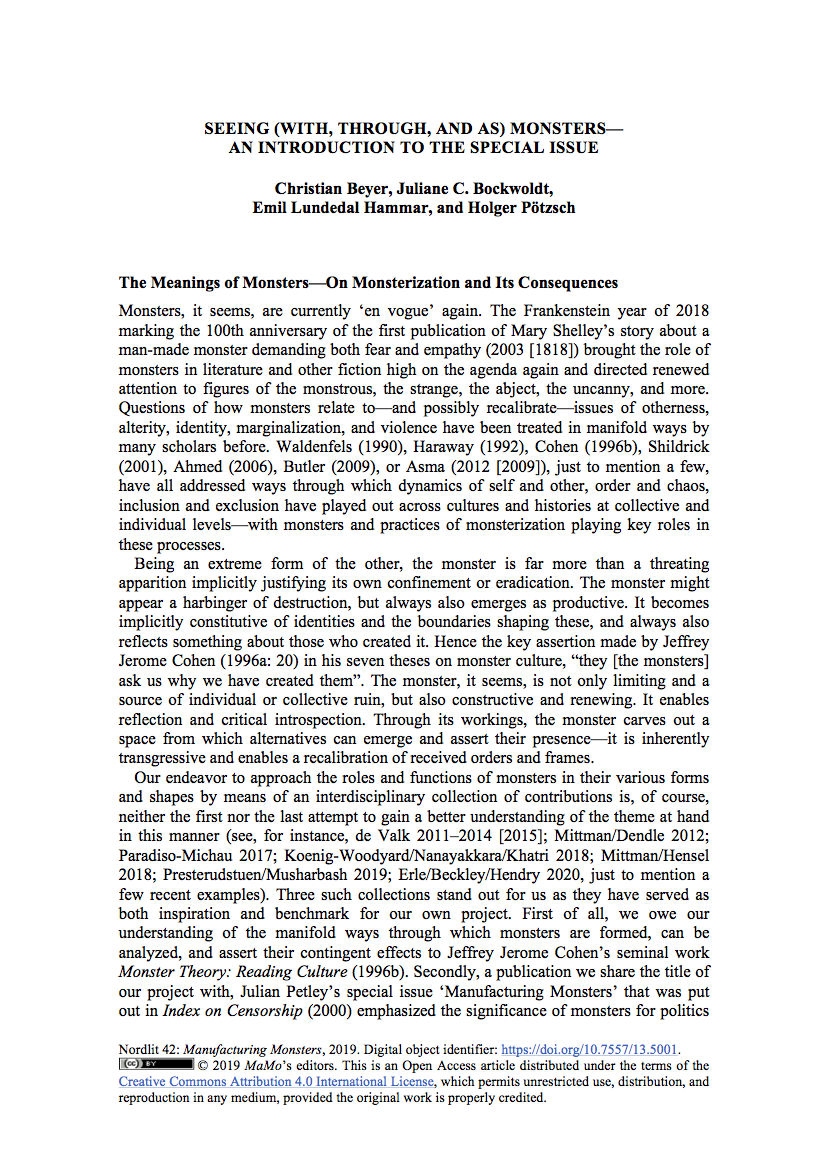Seeing (With, Through, and As) Monsters
An Introduction to the Special Issue
DOI:
https://doi.org/10.7557/13.5001Keywords:
Manufacturing MonstersAbstract
We believe that the representation, construction, manufacture, and exclusion of monsters across genres and media is an increasingly pressing issue for individuals and civil societies on a global scale. The widespread use of exaggerated frames presenting a variety of others as mere threats has deadly consequences for many people—worldwide. And, ‘Western’ liberal democratic elites urgently need to acknowledge their own role in such processes as the current construction of ‘Monster Assad’ as a Hitler-esque tyrant intending to ‘gas his own people’ or the continuing framing of Iran as ‘a nuclear threat to world peace’ lead by ‘nuke-building, apocalyptic mullahs’ are equally irresponsible and dangerous acts as the presentation of ‘non-normative’ persons as a menace to cultural and societal stability or the assumption that certain people are simply born as terrorists. We believe that as researchers, students, employees, workers, pupils, retirees, and others—in sum: as citizens—, we must be aware of such discursive moves of othering and exclusion and learn to identify these, connect them to underlying interests, and then resist and subvert them to avoid more killings in our or others’ names. This is our responsibility especially as contemporary global crises intensify bringing with them the need for ever new scapegoats to explain away the real contradictions underlying these relentless challenges.
References
Ahmed, Sara. 2006. Queer Phenomenology: Orientations, Objects, Others. Durham: Duke University Press. Digital object identifier: https://doi.org/10.1215/9780822388074.
Andersen, Robin. 2006. A Century of Media: A Century of War. New York: Peter Lang.
Asma, Stephen T. 2012 [2009]. On Monsters: An Unnatural History of Our Worst Fears. Reprint edition. Oxford: Oxford University Press.
Beyer, Christian. 2019 [forthcoming]. “On the Manufacture of Knowledge and Monstrous Information Overload: Manufacturing Monsters in Focus”, in Theory and Praxis as Challenges for Borderology: Events and Knowledge on the Borders, edited by Alexander Sautkin. Murmansk: Murmansk Arctic State University, prelim. 40–67.
Butler, Judith. 2009. Frames of War: When Is Life Grievable? London: Verso.
Buzan, Barry, Jaap de Wilde, and Ole Wæver. 1998 [1997]. Security: A New Framework for Analysis. Reprint edition. London: Lynne Rienner.
C-SPAN [Cable-Satellite Public Affairs Network]. 2017 [1961]. “President Dwight [D.] Eisenhower[’s] Farewell Address: January 17, 1961”, C-SPAN 3, January 17. Available online: https://www.c-span.org/video/?15026-1/president-dwight-eisenhower-farewell-address [September 11, 2019].
Catte, Elizabeth. 2018. What You Are Getting Wrong About Appalachia. Cleveland: Belt Publishing.
Cohen, Jeffrey Jerome. 1996a. “Monster Culture (Seven Theses)”, in Monster Theory: Reading Culture, edited by Jeffrey Jerome Cohen. Minneapolis: University of Minnesota Press, 3–25. Digital object identifier: https://doi.org/10.5749/j.ctttsq4d.4.
Cohen, Jeffrey Jerome (ed.). 1996b. Monster Theory: Reading Culture. Minneapolis: University of Minnesota Press. Digital object identifier: https://doi.org/10.5749/j.ctttsq4d.
de Valk, Mark (ed.). 2011–2014 [2015]. Monsters and the Monstrous 1:1–4:1 [5:1] (biannual journal).
Der Derian, James. 2009 [2001]. Virtuous War: Mapping the Military–Industrial–Media–Entertainment Network. Expanded, second edition. London: Routledge. Digital object identifier: https://doi.org/10.4324/9780203881538.
Edwards, David, and David Cromwell. 2018. Propaganda Blitz: How the Corporate Media Distort Reality. London: Pluto Press. Digital object identifier: https://doi.org/10.2307/j.ctv69tg4v.
Erle, Sibylle, Pat Beckley, and Helen Hendry (eds.). 2020 [forthcoming]. Nature—International Journal of Science 152:x (special issue: ‘Monsters: Interdisciplinary Explorations of Monstrosity’).
Galtung, Johan. 1969. “Violence, Peace, and Peace Research”, Journal of Peace Research 6:3, 167–191. Digital object identifier: https://doi.org/10.1177/002234336900600301.
George, Cherian. 2016. Hate Spin: The Manufacture of Religious Offense and Its Threat to Democracy. Cambridge: MIT Press. Digital object identifier: https://doi.org/10.7551/mitpress/9780262035309.001.0001.
Haraway, Donna. 1992. “The Promises of Monsters: A Regenerative Politics for Inappropriate/d Others”, in Cultural Studies, edited by Lawrence Grossberg, Cary Nelson, and Paula Treichler. London: Routledge, 295–337.
Hellstrand, Ingvil, Line Henriksen, Aino-Kaisa Koistinen, Donna McCormack, and Sara Orning (eds.). 2018. Somatechnics 8:2 (special issue: ‘Promises of Monsters’). Digital object identifier, referring to the guest editors’ introduction therein: https://doi.org/10.3366/soma.2018.0247.
Hellstrand, Ingvil, Line Henriksen, Siv Frøydis Berg, and Christian Beyer. 2019. “Why the Monster and Why Now?”, Monster Talks 1, January 23. Podcast recorded at the panel discussion ‘Monster Talks’, Haunted Humanity, November 30, 2018. Stavanger: The Monster Network. Available online: https://themonsternetwork.com/2019/01/23/monster-talks-1-why-the-monster-and-why-now/ [September 11, 2019].
Herman, Edward S., and Noam Chomsky. 2002 [1988]. Manufacturing Consent: The Political Economy of the Mass Media. Reprint edition. New York: Pantheon Books.
Koenig-Woodyard, Chris, Shalini Nanayakkara, and Yashvi Khatri (eds.). 2018. University of Toronto Press Quarterly 87:1 (special issue: ‘Monster Studies’). Digital object identifier, referring to the guest editors’ introduction therein: https://doi.org/10.3138/utq.87.1.1.
MacLeod, Alan. 2019. “Chavista ‘Thugs’ vs. Opposition ‘Civil Society’: Western Media on Venezuela”, Race & Class 60:4, 46–64. Digital object identifier: https://doi.org/10.1177/0306396818823639.
Mehr, Nathaniel. 2009. “Grievable and Ungrievable Lives”, Red Pepper, June 9. Available online: https://www.redpepper.org.uk/grievable-and-ungrievable-lives/ [September 11, 2019].
Merlingen, Michael. 2008. “Monster Studies”, International Political Sociology 2:3, 272–274. Digital object identifier: https://doi.org/10.1111/j.1749-5687.2008.00049_5.x.
Mittman, Asa Simon, and Peter J. Dendle (eds.). 2012. The Ashgate Research Companion to Monsters and the Monstrous. Farnham: Ashgate.
Mittman, Asa Simon, and Marcus Hensel (eds.). 2018. Classic Readings on Monster Theory. Leeds: Arc Humanities Press. Digital object identifier: https://doi.org/10.5040/9781641899482.
NARA [National Archives and Records Administration]. 2006 [1961]. “Transcript of President Dwight D. Eisenhower’s Farewell Address (1961)”, Our Documents—100 Milestone Documents, July 4. Available online: https://www.ourdocuments.gov/doc.php?flash=false&doc=90&page=transcript [September 11, 2019].
Paradiso-Michau, Michael R. (ed.). 2017. Listening—Journal of Communication Ethics, Religion, and Culture 52:3 (special issue: ‘Listening to Our Monsters’).
Parenti, Michael. 1992 [1986]. Inventing Reality: The Politics of News Media. Second edition. New York: Wadsworth Publishing.
Petley, Julian (ed.). 2000. Index on Censorship 29:5 (special issue: ‘Manufacturing Monsters’). Digital object identifier, referring to Stanley Cohen’s introductory contribution therein: https://doi.org/10.1080/03064220008536797.
Presterudstuen, Geir Henning, and Yasmine Musharbash (eds.). 2019 [forthcoming]. Monster Anthropology: Ethnographic Explorations of Transforming Social Worlds Through Monsters. London: Bloomsbury.
Reinke de Buitrago, Sybille (ed.). 2012. Portraying the Other in International Relations: Cases of Othering, Their Dynamics and the Potential for Transformation. Cambridge: Cambridge Scholars.
Shelley, Mary Wollstonecraft. 2003 [1818]. Frankenstein [or, The Modern Prometheus]. Reprint edition. London: Penguin.
Shildrick, Margrit. 2001. Embodying the Monster: Encounters with the Vulnerable Self. London: Sage.
Waldenfels, Bernhard. 1990. Der Stachel des Fremden. Frankfurt am Main: Suhrkamp.









